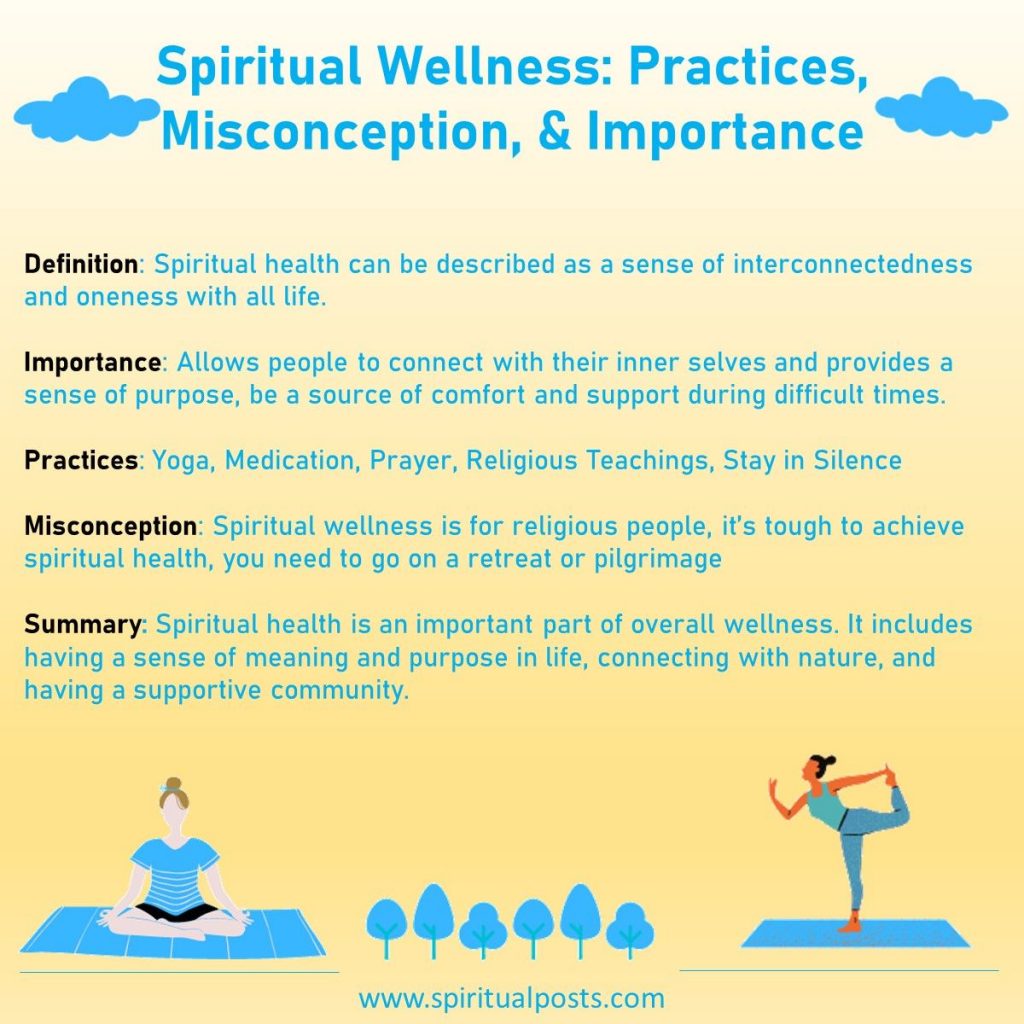What is Spiritual Health?: Definition & Examples

Spiritual health is a term that is often used, but not always well understood. Spiritual wellness can be described as a sense of interconnectedness and oneness with all life.
It includes the development and use of personal values and beliefs to guide behavior, as well as a sense of purpose or meaning in life.
Spiritually healthy people often have strong relationships with others, feel connected to something larger than themselves, and exhibit compassion and altruism.

Key Takeaways
Definition of Spiritual Health and Wellness

Spiritual wellness is a state of mind that is achieved when you have both physical and mental well-being. It is important to achieve spiritual health because it allows you to connect with your higher power and find peace within yourself.
There are many ways to achieve spiritual health, including prayer, meditation, and self-reflection.
The spiritual health and wellness movement began in the 1960s when the concept of holistic medicine was introduced. It is a small but growing movement that is spreading throughout the world, including the United States.
Many people believe that these practices help them achieve a more balanced lifestyle. Spiritual health is the state of being free from depression, anxiety, and other mental disorders.
It is achieved by following a lifestyle that leads to wellness, including exercise, healthy eating, and positive thinking. The ultimate goal of spiritual health is to have peace within oneself.
A spiritual health practitioner is a person who assists others in achieving a greater level of wellness and the ultimate goal of spiritual health.
Why is Spiritual Wellness Important?

Spiritual wellness is important because it allows people to connect with their inner selves and provides a sense of purpose. It can also be a source of comfort and support during difficult times.
Additionally, spiritual wellness can help people build relationships with others and connect with their community.
What are the Benefits of Spiritual Wellness?

When it comes to life, many things are out of our control. However, one thing we can always rely on is our spiritual foundation.
A strong spiritual foundation can provide us with several benefits, including inner peace, a sense of purpose, and support during difficult times.
By establishing a connection with something larger than ourselves, we can learn to accept the things we cannot change and find the strength to face life’s challenges.
What are the benefits of spiritual wellness? When it comes to spiritual health, many positive aspects can be gained as a result.
1) Inner Peace and Happiness
The first benefit of spiritual wellness is inner peace. If we can learn to accept ourselves and our circumstances, we will find it easier to cope with life’s ups and downs.
The spiritual practice of meditation has been shown to help people feel more peaceful and calm during times of stress.
Happiness is another benefit of spiritual wellness. Spiritual wellness helps people find a sense of inner peace, which in turn makes them happier.
2) Deep Connection with Life
The second benefit of spiritual wellness and development is a deeper connection with life. When we can connect to something greater than ourselves, we can gain a sense of purpose and meaning in our lives. This deeper connection is a powerful way to live.
It can help us understand that our life, good or bad, has meaning and purpose. This deeper connection also allows us to trust in the things we have no control over.
3) Learn to Live in the Present
The third benefit of spiritual health is that it helps us to live in the present moment. We can learn to let go of the past and embrace the present.
When we live in the moment, we have a greater sense of control over our own lives, we are more at peace with ourselves and the world around us, and we can experience the fullness and joy of our lives.
4) Fearless Life
The fourth benefit is that it allows us to live a life free from fear. Fear is a mental state that prevents us from achieving our life goals.
With spiritual wellness, we can learn to let go of fear and live a life based on love and compassion.
Living in the moment allows us to experience more joy, and we feel less threatened by the future. When we are not afraid of what might happen tomorrow, we are able to focus on our goals and learn from each experience that comes our way.
5) Ability to See the Future
The fifth benefit of spiritual development is the ability to see into the future. We can see where we are headed and make our future decisions accordingly.
By knowing the future, we can plan for our long-term goals and live life on a conscious level. Our future is not set in stone. We can create our own destinies and do what we love to do.
6) Greater Appreciation of the World Around You
The final benefit of spiritual development is that it allows us to have a greater appreciation of the world around us. By knowing our purpose, we can see the bigger picture and understand that we are all connected.
How Can You Cultivate Your Spiritual Health?

Practicing spiritual health is an important part of overall health and well-being. It includes developing a personal relationship with a higher power if desired, as well as cultivating qualities such as compassion, forgiveness, and peace.
There are many different ways to achieve spiritual health, and no one path is right for everyone. Some people find their spirituality through religious teachings or practices, while others find it through nature, creative expression, or simply spending time alone in contemplation.
Some common practices and examples of spiritual health and wellness include:
1) Prayer
There is no one right way to pray. Some people pray by talking to God out loud, while others prefer to pray quietly in their own minds.
You can pray any time of day, and in any place – even when you’re driving! Prayer is a way to communicate with God, and it can be a source of comfort and strength.

2) Meditation
Meditation is a way to connect with the divine. It’s one of the most ancient spiritual exercises, and it’s been used by many cultures throughout history.
The benefits of meditation are numerous. It can help you relax, and it can help you feel more connected to the divine.
3) Yoga
The practice of yoga has been around for centuries and is believed to have originated in Nepal and India. The word “yoga” comes from the Sanskrit word “yuj” which means to unite or integrate.
Yoga is a physical, mental, and spiritual practice that aims to unite the body, mind, and spirit. There are many different types of yoga, but all share the same goal of achieving balance and harmony in the body and mind.
Yoga is a great way to improve your health and well-being and can be practiced by people of all ages and fitness levels.

4) Religious Teachings or Practices
Religion is a personal matter for many people. For some, their religious beliefs and practices are an integral part of their lives.
Religion can provide comfort in difficult times and give people a sense of purpose. Some people find solace in the teachings of their religion, while others take comfort in the rituals associated with their faith.
5) Spending Time in Silence
Most people view silence as an absence of noise. However, spending time in silence can be a valuable experience that provides many benefits.
Silence can allow you to connect with your inner thoughts and feelings. It can also help you to relax and rejuvenate your mind and body.
Additionally, silence can improve your focus and creativity. By taking some time each day to experience silence, you can reap these benefits and more.
Whatever your preferred method of connecting with the divine may be, make sure to carve out time for it in your daily routine. This will help you to stay centered and balanced during challenging times.
What are Some Common Misconceptions about Spiritual Health?

Spiritual health is often misunderstood. Many people think that it has to do with religion or that you have to be a certain way to be considered “spiritual.” Here are some of the most common misconceptions about spiritual health:
1. You need to be religious to have good spiritual health. This is not true! Many people identify as spiritual but do not follow any specific religion.
2. Spiritual health is only for people who are struggling or have had a tough life. Again, this is not true! Everyone can benefit from cultivating their spiritual health, regardless of their life circumstances.
3. You need to go on a retreat or pilgrimage to improve your spiritual health. While doing these things can certainly help, they are not necessary to improve your well-being.
Final Words
Spiritual health is an important part of overall wellness. It includes having a sense of meaning and purpose in life, connecting with nature, and having a supportive community.
Spirituality can provide comfort and guidance during difficult times. It can also help people cope with illness and death. Many people turn to religion when they are coping with illness or loss.
We can help people with spiritual health by teaching them that they do not have to be religious to be spiritual. They can choose whatever religion or philosophy works for them and still have a connection with the spiritual world.





